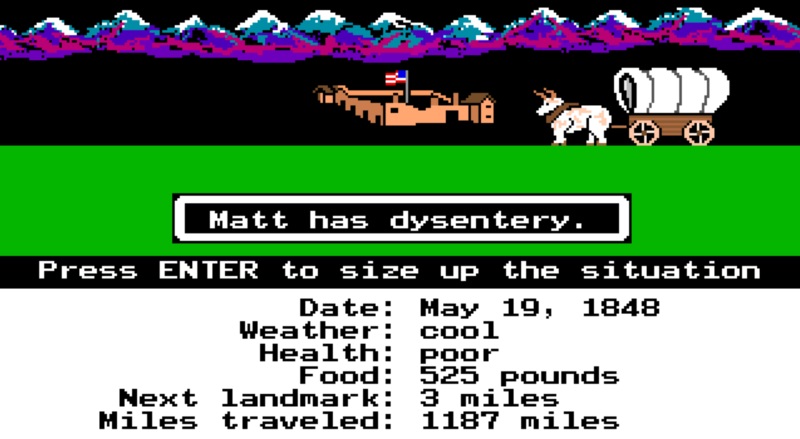Given the increasingly widening range of games classified as “serious”, we have chosen to analyze serious games by the topics they cover, not the mechanics they use. In addition, in the course of this series, we will also discuss how serious issues are treated in mainstream games compared to titles traditionally presented as serious games, and the relative engagement potential and educational value of both approaches.
The first topic we will be covering is how Disease and Disease prevention are treated in a variety of games, including Oregon Trail, Plague Inc, World of Warcraft, and a number of university-hosted educational games.
Oregon Trail
If one was born in the 1980s, one has probably played Oregon Trail at some point in their life – and quite probably has had a party member die of…let’s say dysentery.
In case you’re unfamiliar with dysentery, its a disease of the gut that causes a victim to suffer bloody diarrhea, which can be fatal in the rough conditions of the wilderness. Granted, its rarer these days thanks to improved sanitation (you get it from contact with feces-contaminated water, food, objects), but 130 million people around the world still suffer from it each year, with almost a million deaths.
Now think back to the primitive conditions of the Oregon Trail, where there were no bathroom facilities, no running water, no knowledge that washing your hands could prevent disease – and suddenly, dying of dysentery doesn’t seem so outrageous.
Or deaths from illnesses that didn’t quite become a meme, like the cold, alkali sickness, or scurvy.
Oregon Trail, as a game, isn’t meant to give the player an education on the entire matter of dysentery, its causes, and how it spreads — and its stronger for it.

What makes the Oregon Trail work is its focus on educating the player about the experience of travelling the Oregon Trail, its hardships, and the difficulties faced during these travels. By showcasing disease as one of several of these hardships, the status of the (omnipresent) diseases your party members suffered became memetic, earning a legendary status that persists on online forums, T-shirts, and all sorts of video game memorabilia.
This is important, because while Oregon Trail only sets out to expose its players to a fairly limited series of educational goals, it succeeds rather well on these by making it part of the experience — it is learning done by exploring the game, not by simply dumping information at the player.